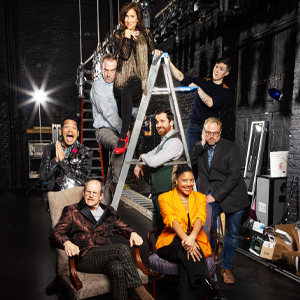Oh, What a Knight!
By John Ahlin
If I may, I’d like to humbly offer a few tedious and brief thoughts on playing Sir John Falstaff. Henry IV, Part 2 marks the last leg of my Falstaff Triple Crown here at Pennsylvania Shakespeare Festival, having already done Henry IV, Part 1 and The Merry Wives of Windsor. But, Ahab-like, I have been pursuing this whale of a man for nearly my whole career, and with this production I think I will have played Falstaff from the three plays a total of 15 times. Yet I truly feel in playing Sir John I am not trotting out the same old tired performance. On the contrary, every time I surf the Big Sir it only skims the oceanic vastness this globe of a man presents, as he spins magnificently in the larger universe of Shakespeare. There is so much more—so much new to explore—that, being here, now, getting to play Falstaff anew and afresh, I can say I am as excited as any time in my long career.
And tackling Falstaff in this original way, the “Extreme Shakespeare” fashion: just jumping in, lines learned, four days of rehearsal, and no director, is exhilarating …like bounding into the Versailles of bouncy castles.
“Tackling” is actually the perfect word in that it originates from the idea of gaining control over something with tackle, or ropes, like a wild horse or Professor Marvel’s balloon. Falstaff cannot be tied down; he rises, ascends, soars till “in the clear sky of fame he o’ershines all, as much as the full moon doth the stars in the firmament.” Since I have a unique vantage point—15 times inside the belly of the behemoth—I’ll now, Shakespeare-like, coin a new word: Anthro-portray-ology, meaning: the study of Falstaff by performing him. Herewith are a few clumsy, random and oddball observations I’ve made of the Fat Knight by being the Fat Knight.
The key is freedom! Othello, Hamlet, the Scottish King, and Lear are all hobbled within their first few scenes by fate’s fickle hand, learning of what will plunge them, as Sir Ralph Richardson puts it: “Into an avalanche of circumstances that will become a terrific drubbing in Shakespeare’s washing machine, stripping the characters to the very thread of their fabric.”
Of all Shakespeare’s greatest creations, only Falstaff isn’t taken to the cleaners. Slight spoiler alert (this sentence only), Falstaff doesn’t find out his fate until the last possible moment …his Shakespearean flaw is a blind spot in his inestimable wisdom…he didn’t see the trap he can’t escape coming. (Resume reading)
Falstaff is free…free to be Falstaff through all his plays. Free to do whatever it takes to survive, to which an actor can bring all his imagination, cleverness and experience in creating the character. Falstaff is like a chess queen that can move twice in a row; he has nearly boundless freedom.
Playing Sir John is a buffet accompli! He’s not simply Vice, or the Lord of Misrule, or some archetype; he is all things…he is vastly human. Falstaff is fully formed, forged by a ruthless world set against him. But he fights back with all he’s got: aplomb, charm, pathos, rationality, sagacity, invention, appetite, learning, and a dozen more. And chief amongst his weapons is his wit. His nimble, youthful mind out thinks anyone: “I am only old in judgement and understanding,” he says. He is the greatest rhetorical escape artist in all literature, swiping the cheese out of any verbal trap. The feast of facets that is Falstaff will make any actor fat with acting choices.
A cowardly liar? Imposerous! Embellisher yes, raconteur yes, but Falstaff sees clearly how the world works. He may steal a purse, but he will not be lectured to by those who steal a crown. He sees through “honor” to what it can sometimes result in—being bluntly dead. He rejects war’s self-sacrifice on principle, hollering “Give me life!” on the battlefield. He is a lover not a fighter, but if badgered into a corner, he will wolverine his way out using his genuine ferocity; he’ll put the fist in pacifist.
For centuries critics called him a coward, and labeled his antics “a parody” of a soldier. They couldn’t comprehend that Falstaff’s choice to avoid foolishness and folly would become a legitimate viewpoint. A viewpoint standing in stark contrast to Henry IV’s, whose dying word of advice to Hal is to “busy giddy minds with foreign quarrels.” Shakespeare was ahead of his time…ahead of all time.
Get that prince over the finish line! Falstaff, the Bible-quoting hulk, pursues a single less-than-divine goal; redemption on Earth. He seeks not Elysian but strawberry fields…forever. And for that he must survive this cruel world until Hal, his presumed patron, becomes king. He only has to delay the decay of his aging body. Shakespeare always has sub-themes in his plays, and Henry IV, Part 2 constantly touches on growing old, disease, and mortality. Falstaff is acutely aware of time. He has heard the “chimes at midnight” but never gives up hope of a golden dawn.
Falstaffection! What I love most playing Falstaff is Shakespeare’s sub-theme of having Sir John measuring everyone he meets by how they can laugh. From the moment he first limps onstage chiding all humankind that he alone is the cause of all laughter to the moment his life changes hearing the new king say “Reply not with a fool-born jest,” laughter is Falstaff’s life’s blood. For me the saddest moment in Part 2 is Falstaff planning how he will make Prince Harry laugh…pining for a once-was that he doesn’t know is a never-will-be.
There is honor in that word Falstaff! The one-of-a-kind unrequited love story that is Falstaff and Hal in both Part 1 and Part 2 is not only momentous within Shakespeare‘s canon, but all theatre! The Act 2, Scene 4 tavern scene in Part 1, where Hal and Falstaff take turns majestificently playing Hal’s father, the king, and then Falstaff hilariously portraying Hal, with all that is unsaid and below the surface, to me is the birth of modern theatre…the fulcrum on which all theatre is catapulted toward its full potential.
And then to play its mirror, the Act 2, Scene 4 tavern scene in Part 2, with decay and entropy hanging heavy, and glory gone, with Falstaff speaking of being “the man of action,” it is Shakespeare’s genius to have Hal run out to do his duty. The world is seeing (and needing) Henry V for the first time!
When you think that the next thing Shakespeare created when he took up his quill again was Beatrice and Benedick, you know he was in the groove of all time; his greatest plays were about to spill forth. Shakespeare changed theatre by creating human beings; alive, introspective, flawed, conflicted. And in my view, Falstaff is the most human…and greatest of them all.
To stand on stage and share him with these wonderful, smart PSF audiences is…is…well, some new word has yet to be coined to perfectly describe this glorious, joyous feeling. ■











